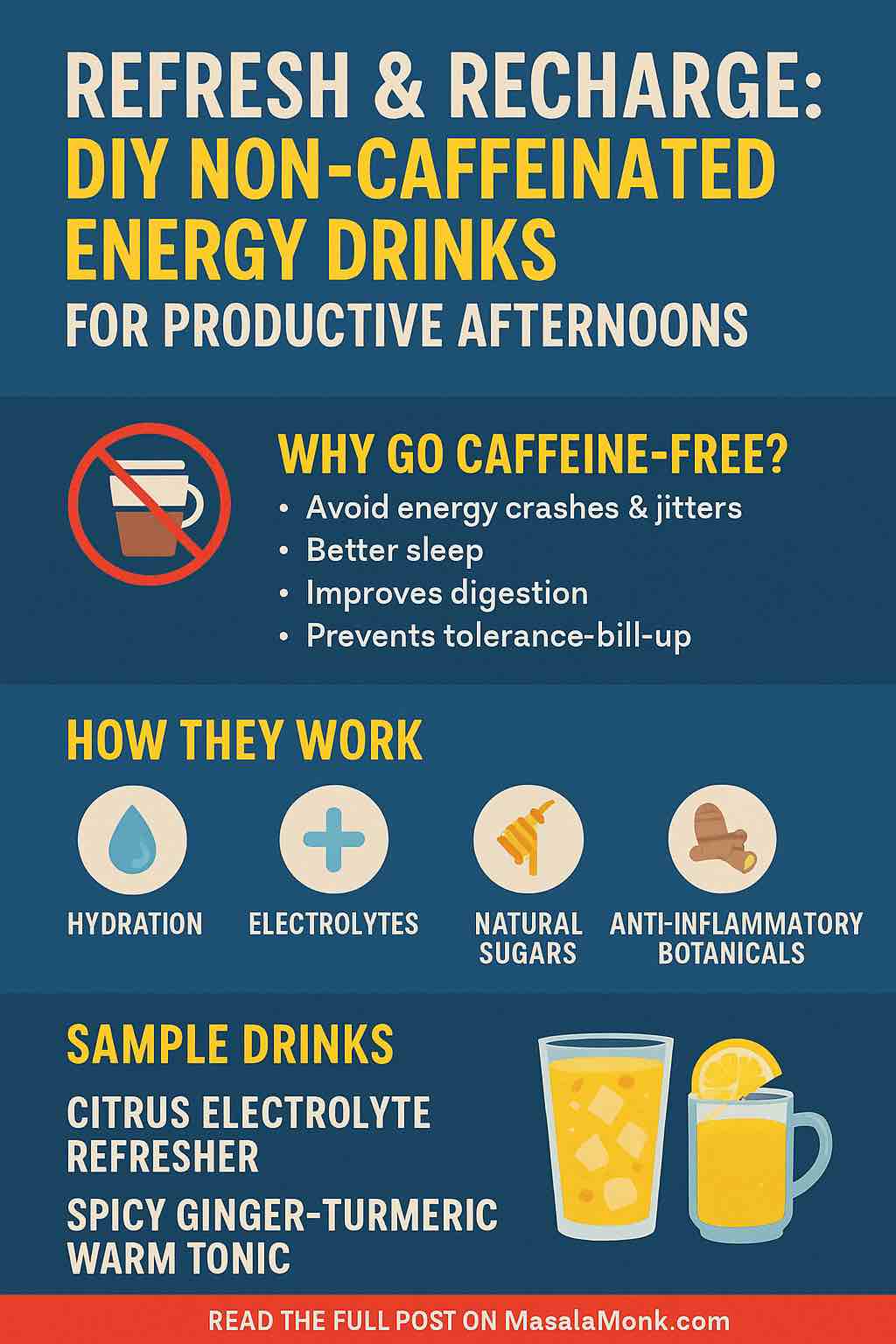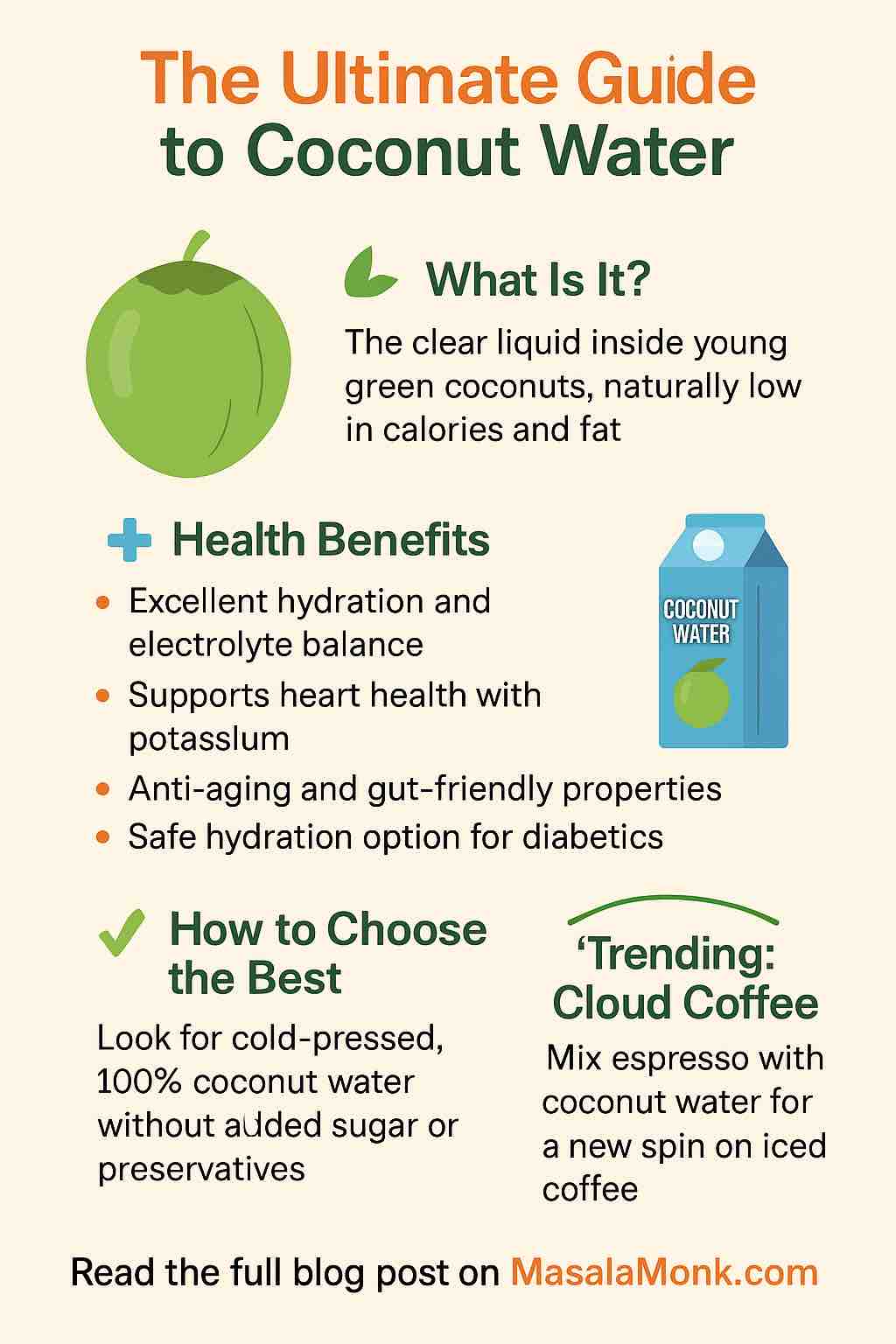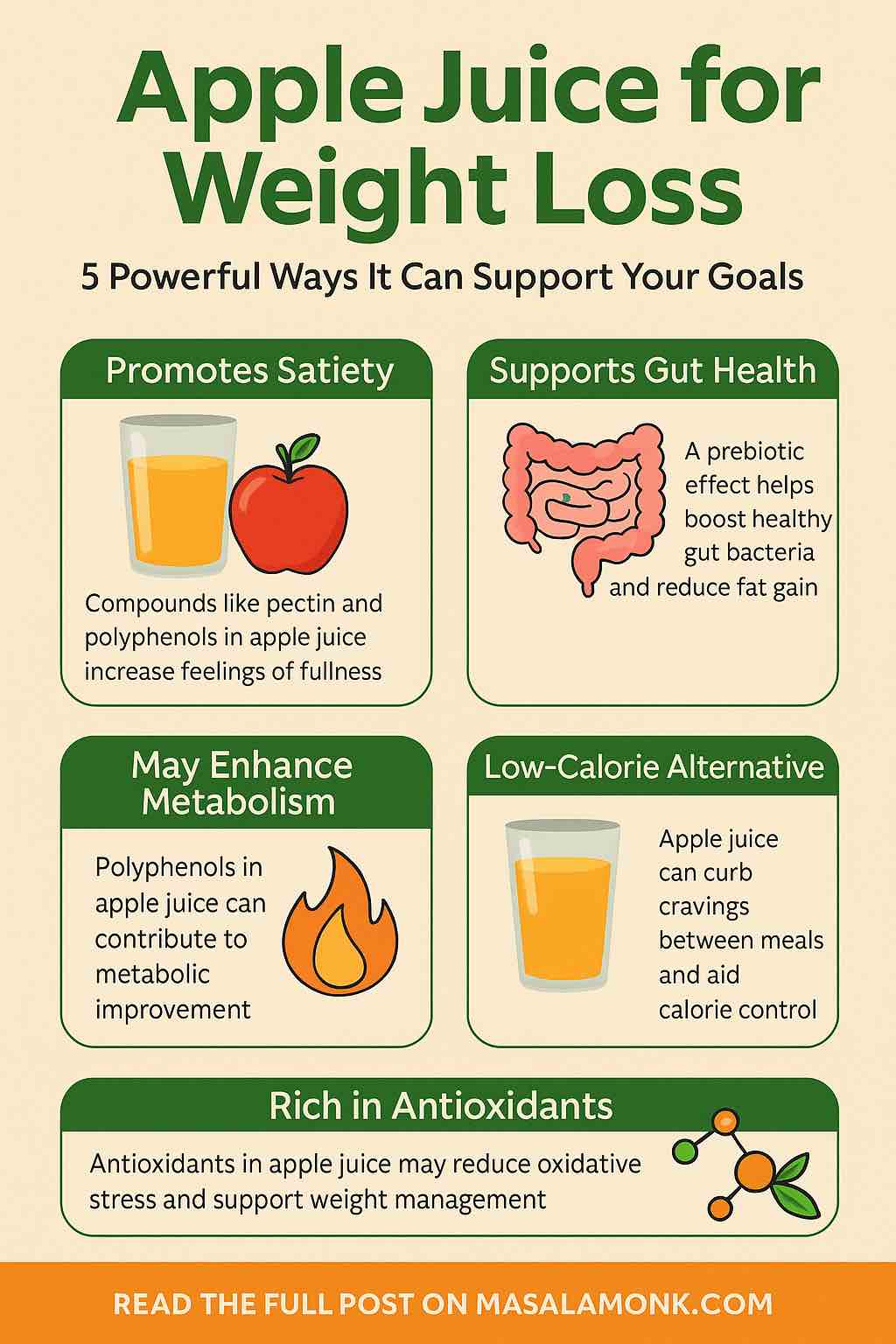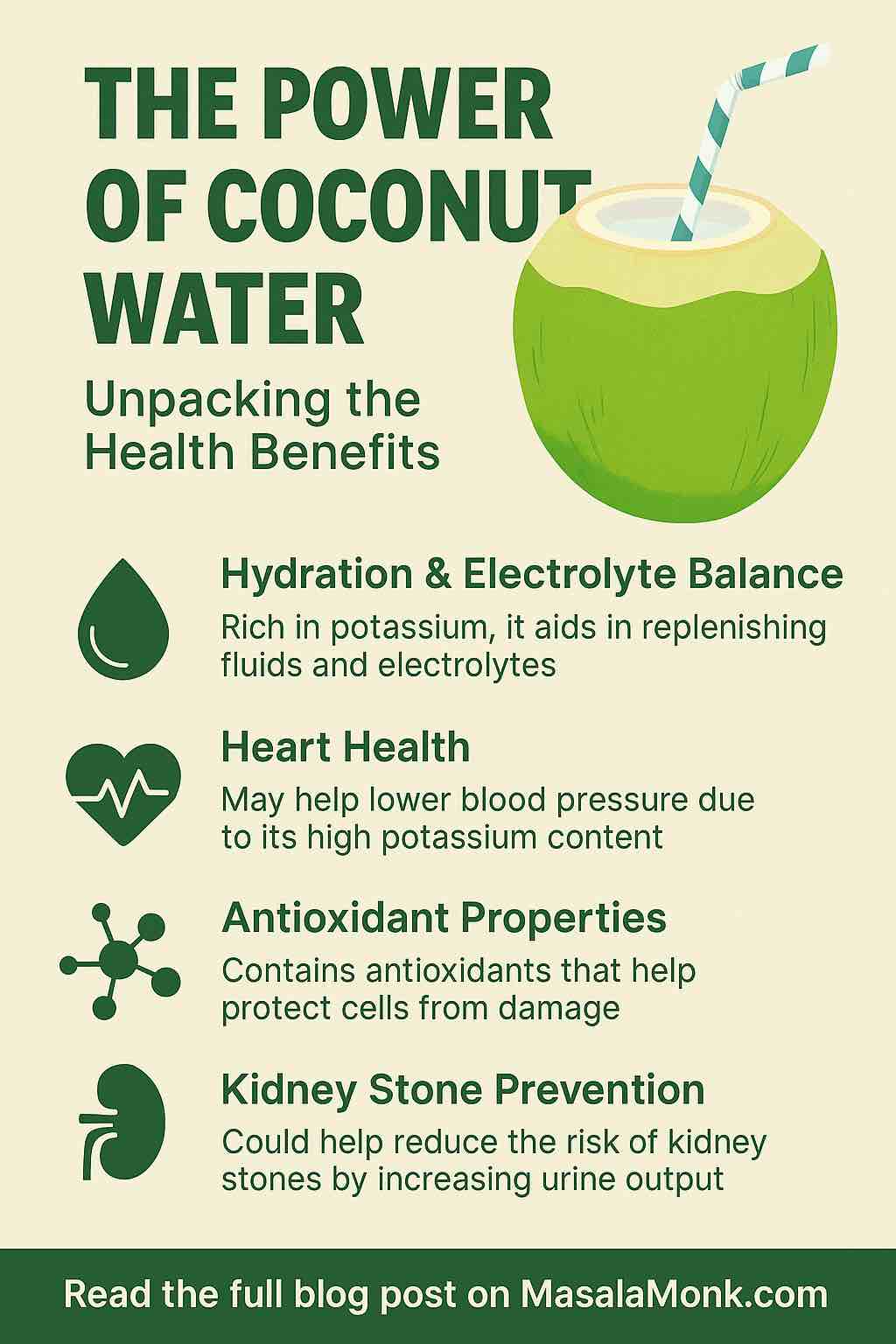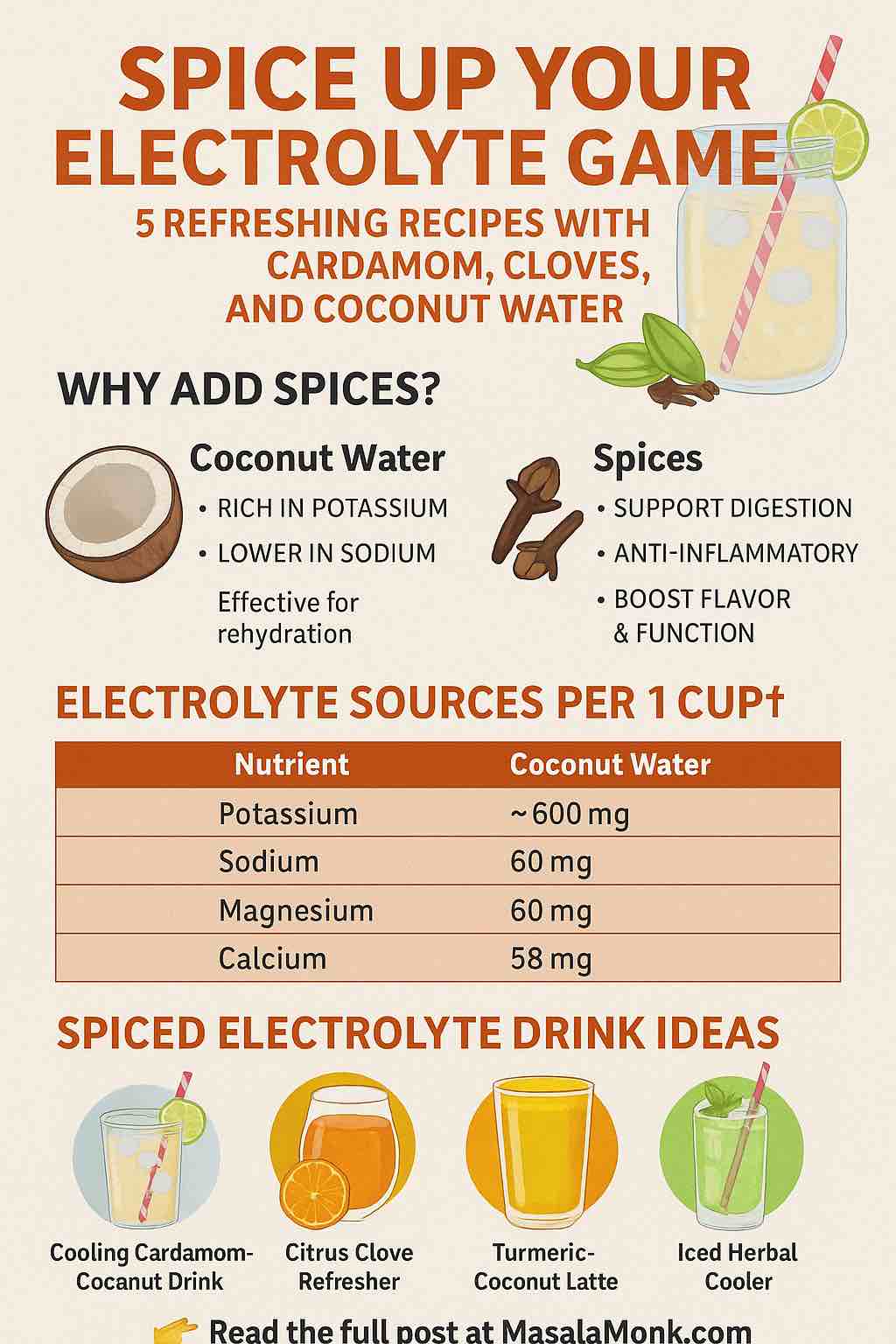
When summer heat strikes or you’re coming off an intense workout, your body craves more than just plain water. It needs electrolytes—essential minerals like potassium, sodium, magnesium, and calcium—to help regulate fluid balance, nerve function, and muscle contractions. But what if your hydration routine could be more than functional—what if it could also be flavorful, aromatic, and deeply rejuvenating?
Enter coconut water, cardamom, and cloves—a trio rooted in ancient wellness traditions and now validated by modern science. In this post, we explore why this combination makes so much sense for hydration, and we share 5 practical and delicious electrolyte drink recipes you can make at home.
🧪 Why These Ingredients?
🥥 Coconut Water: Nature’s Sports Drink
Coconut water is packed with potassium (over 600 mg per cup), magnesium, calcium, and a touch of natural sugar. It’s low in calories and naturally hydrating, making it ideal for:
- Post-exercise recovery
- Replenishing fluids after illness
- Daily hydration with added benefits
📌 But note: Coconut water is low in sodium, which is the primary electrolyte lost in sweat. If you’re using it after a tough workout or in high-heat conditions, consider adding a pinch of sea salt.
🌿 Cardamom: The Digestive Hero
Used in Ayurveda for centuries, cardamom isn’t just about flavor. It’s also:
- A carminative (reduces bloating and gas)
- Anti-inflammatory and antioxidant
- A natural breath freshener
- Supportive of metabolic health and circulation
Cardamom gives your drink a complex, citrusy-mint aroma that balances well with coconut water’s sweetness.
🌰 Cloves: Tiny but Mighty
Cloves pack a strong, warming punch and are:
- Antimicrobial and antifungal
- Great for digestion and liver support
- Rich in eugenol, a potent anti-inflammatory compound
- Shown to regulate blood sugar in some small-scale studies
Used in small amounts, cloves offer a grounding counterbalance to the brightness of cardamom and the sweetness of coconut water.
⚖️ Getting the Balance Right
Electrolyte Targets
Here’s a rough guide to what your body needs per day (more during heat or exertion):
| Electrolyte | Daily Need | Coconut Water (1 cup) |
|---|---|---|
| Potassium | 2,600–3,400 mg | ~600 mg |
| Sodium | 1,500–2,300 mg | ~60 mg |
| Magnesium | 300–420 mg | ~60 mg |
| Calcium | 1,000–1,200 mg | ~58 mg |
To make coconut water a fully effective electrolyte beverage, consider adding:
- ¼ tsp sea salt per 2 cups of coconut water
- Citrus juice for flavor + vitamin C
- Chia seeds for hydration and fiber
🍹 5 Spiced Electrolyte Drink Recipes
Each recipe is based on coconut water and includes spice elements to maximize both flavor and function.
1. Cooling Cardamom-Coconut Electrolyte Drink
Ingredients:
- 2 cups coconut water
- ¼ tsp sea salt
- 4 green cardamom pods, lightly crushed
- 1 tsp lime juice
- 1 tsp honey or maple syrup (optional)
- Ice
Instructions:
- Muddle the cardamom pods in a mortar to crack them open.
- Add them to the coconut water and let steep for 15–30 minutes in the fridge.
- Strain, then add sea salt, lime juice, and sweetener (if using).
- Serve over ice.
🟢 Why it works: Cardamom supports digestion, balances the sweetness of coconut water, and elevates the aroma.
2. Spiced Citrus Clove Electrolyte Refresher
Ingredients:
- 2 cups coconut water
- ¼ tsp sea salt
- 3 whole cloves
- Juice of ½ orange
- Juice of ½ lemon
- Optional: ½ tsp raw sugar or jaggery syrup
Instructions:
- Add cloves to a small amount of warm coconut water. Steep 10 minutes.
- Mix the infused water with the rest of the coconut water.
- Add citrus juices and salt, stir well.
- Chill and serve.
🟠 Why it works: Citrus enhances vitamin C and flavor; cloves add digestive and antioxidant benefits.
3. Golden Coconut Electrolyte Latte (Warm)
Ingredients:
- 1½ cups coconut water
- ½ cup almond or oat milk
- 1 green cardamom pod
- 1 clove
- ¼ tsp turmeric
- Pinch of sea salt
- Optional: honey to taste
Instructions:
- Simmer everything together in a small pot (do not boil).
- Steep for 5 minutes, then strain.
- Sip warm as a post-yoga or evening hydrating tea.
🟡 Why it works: Combines warmth, spices, and electrolytes—perfect for cooler days or after intense workouts.
4. Electrolyte Chia Switchel
Ingredients:
- 2 cups coconut water
- 1 tbsp chia seeds
- ¼ tsp ground cardamom
- 1 tbsp apple cider vinegar
- 1 tsp molasses or maple syrup
- Pinch of salt
- Optional: a single clove, steeped 5 min in hot water
Instructions:
- Bloom chia seeds in coconut water for 15–30 minutes.
- Mix in vinegar, syrup, spices, and salt.
- Serve chilled and shake before drinking.
⚫ Why it works: Chia seeds enhance hydration; vinegar aids gut health; molasses adds iron + flavor depth.
5. Iced Herbal Electrolyte Cooler
Ingredients:
- 1 cup coconut water
- 1 cup hibiscus tea (chilled)
- 1 clove
- 1 cardamom pod
- ¼ tsp sea salt
- Juice of ½ lime
- Mint leaves for garnish
Instructions:
- Brew hibiscus tea with cardamom and clove; chill.
- Mix with coconut water, lime juice, and salt.
- Serve over ice with mint.
🔴 Why it works: Hibiscus is antioxidant-rich; this is a visually stunning and tangy summer drink.
🧠 Pro Tips for Usage
- When to drink:
- Pre/post workout
- Midday hydration
- Recovery from heat, illness, or travel
- Storage: These drinks are best consumed within 24 hours. If making ahead, store in the fridge and stir/shake before use.
- Spice handling: Use whole spices for infusions and strain before drinking. Ground versions work but may leave sediment.
🔚 Final Thoughts
Coconut water alone is a great hydration tool, but when you layer it with cardamom and cloves, you unlock both culinary pleasure and functional health benefits. Whether you’re a fitness enthusiast, an Ayurvedic wellness follower, or just someone who wants more from their beverages, these drinks are simple, customizable, and effective.
Instead of reaching for sugary sports drinks or bland electrolyte mixes, make your hydration ritual an experience.
📘 Frequently Asked Questions (FAQs)
1. Can I use bottled coconut water for these recipes?
Yes, but check the label. Choose unsweetened coconut water without added flavors or preservatives. Avoid anything labeled “from concentrate” if you want the purest electrolyte profile.
2. Do these drinks replace commercial sports drinks?
Yes—for light to moderate exercise, these recipes are excellent. But if you’re doing intense, prolonged workouts or sweating heavily, add extra sodium (¼–½ tsp sea salt per liter) to match what you lose through sweat.
3. Can I use ground cardamom and clove instead of whole?
You can, but whole spices provide a cleaner infusion and better flavor control. Ground spices may leave residue and overpower the drink. If using ground, start with a small pinch.
4. Are these drinks safe for people with high blood pressure or kidney issues?
Caution is advised. Coconut water is high in potassium, which is good for most people—but those with chronic kidney disease or on certain medications (like ACE inhibitors) should consult a doctor first.
5. Can I drink these every day?
Yes—1–2 cups per day is safe for most healthy adults. These drinks are great for regular hydration, but don’t rely on them as a sole source of electrolytes or nutrition.
6. Do I need to sweeten these recipes?
Not necessarily. Coconut water is slightly sweet on its own. But if you prefer a bit more flavor, use natural sweeteners like honey, maple syrup, or jaggery in small amounts.
7. Can I batch these drinks ahead of time?
Absolutely. You can make a 1–2 day batch and store it in a sealed container in the fridge. Just stir or shake before drinking to redistribute any spices or chia seeds.
8. Can I use warm coconut water for infusions?
Yes. Gently warming coconut water (without boiling) can help extract flavor from spices more effectively, especially for clove and cardamom. Let it cool before drinking.
9. What can I add for extra hydration or benefits?
Try:
- Chia seeds (for hydration + fiber)
- Lemon/lime juice (vitamin C + flavor)
- Apple cider vinegar (gut health)
- Mint or basil (cooling and refreshing)
- Turmeric (anti-inflammatory)
10. How do these drinks help with digestion?
Cardamom and cloves are both carminative spices—they reduce gas, bloating, and support digestive enzyme activity. They’re especially helpful after meals or physical activity.

